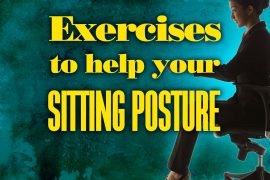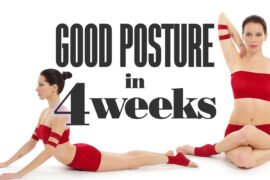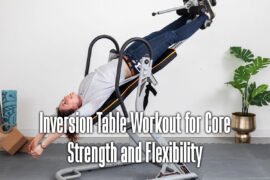[Updated on 1 January 2024] Many people suffer from neck pain because they spend plenty of time looking at computers or phones. Your neck may become stiff when your muscles weaken due to poor posture or incorrect use over time. If you have weak neck muscles and attempt to turn your head, the joint may navigate unevenly as it has shifted from its original position. Sometimes the joint gets caught in something, which can cause a pulled muscle or irregular nerve pain, or perhaps both.
“If that happens, you’ll experience immediate pain, and your body will likely respond with a protective spasm.” When you get hurt, your body may clench to protect you from further injury. As a result, you may feel immobile and wonder how you got hurt.
Staring at your computer screen for prolonged periods of time can fatigue and strain the muscles surrounding your neck joints. Looking at your smartphone for longer periods of time and driving long distances can have similar effects on your neck. Continuously engaging in these activities can eventually displace the joints in your neck.
What Is Tight Neck Muscles?
Table of Contents
Tight neck muscles refer to increased tension or stiffness in the neck muscles. This condition is commonly known as neck muscle tightness or neck muscle tension. It can cause discomfort, limited range of motion, and pain in the neck & surrounding areas. Tight neck muscles can be caused by various factors, including poor posture, stress, muscle strain, overuse, and underlying medical conditions. Stretching exercises, applying heat or cold packs, practicing relaxation techniques, and maintaining good posture are common approaches for relieving tight neck muscles.
Causes Of Tight Neck Muscles
The causes of tight neck muscles can vary but commonly include the following:
- Poor posture: Prolonged periods of sitting or working with incorrect posture can strain the neck muscles and lead to tightness.
- Muscle tension and stress: Emotional or mental stress can cause muscle tension, including in the neck area.
- Repetitive motions: Repeating the same movements, like working at a computer or lifting heavy objects, can strain the neck muscles.
- Injury or trauma: Whiplash or other neck injuries can result in muscle tightness and stiffness.
- Sleeping position: Sleeping in an awkward and uncomfortable position can strain the neck muscles and cause tightness.
- Muscle imbalances: Weakness or imbalances in certain muscle groups can cause compensation and tightness in the neck muscles.
- Degenerative conditions: Conditions like cervical spondylosis or herniated discs can contribute to neck muscle tightness.
- Medical conditions: Certain medical conditions, like fibromyalgia or temporomandibular joint disorder (TMJ), can lead to neck muscle tightness as a symptom.
Symptoms Of Tight Neck Muscles
Symptoms of tight neck muscles may include:
- Limited range of motion: Tight neck muscles can restrict movement, making it difficult to turn your head from side to side and bend it forward or backward.
- Headaches: Tension in the neck muscles can cause tension headaches, which typically manifest as a dull, aching pain that may radiate from the back of the head to the forehead.
- Muscle spasms: Tight muscles may experience involuntary contractions or spasms, resulting in sudden, painful twitches or jerking movements.
- Muscle fatigue: Prolonged muscle tension can lead to muscle fatigue, causing a sensation of weakness or heaviness in the neck.
- Shoulder and upper back discomfort: The tightness in the neck muscles can extend to the shoulders and upper back, resulting in additional pain, stiffness, or discomfort in those areas.
- Numbness or tingling: In some cases, tight neck muscles can compress nerves in the neck region, leading to sensations of numbness, tingling, or a pins-and-needles feeling that may radiate down the arms.
Serious Symptoms That May Indicate A Life-Threatening Condition
In certain situations, if you experience neck tightness or pain along with other symptoms that could be a sign of a severe or potentially fatal condition like meningitis, a heart attack, or spinal injury, it is crucial to seek emergency medical attention immediately. If you experience any symptoms along with a stiff neck or neck discomfort, it is important to seek immediate medical care:
- Rash
- Jaw pain
- Droopy eyelid
- Difficulty swallowing
- Chest pain, tightness, or pressure
- Difficulty breathing or shortness of breath
- Neck stiffness that prevents you from touching your chin to your chest
- Nausea and vomiting
- Abnormal pupil size or nonreactivity to light
- Numbness or change in sensation
- Paralysis or difficulty moving any area of your body
- Flu-like symptoms (fatigue, fever, sore throat, headache, cough, aches and pains)
Musculoskeletal Causes Of Tight Neck Muscles
The feeling of tightness in the neck area can be caused by muscle strains, ligament sprains, and other issues related to the musculoskeletal system. Here are various causes which include:
- Excessive stress or tension
- Activities that require repeatedly turning the head from side to side.
- Cervical spine fracture or spinal cord trauma
- Holding the neck in an abnormal position or keeping it immobile for long periods.
- Injuries include falls, trauma from accidents like car crashes, and injuries sustained during sports activities.
- Osteoarthritis is a type of arthritis where the cartilage and bone in joints degenerate, while rheumatoid arthritis is a chronic autoimmune illness that causes joint inflammation.
- Sleeping or resting in an awkward position
- Spinal degeneration (spondylosis, a degenerative disc disease)
- Whiplash (cervical sprain or strain, neck hyperextension followed by hyperflexion)
- Spinal stenosis is a situation where the spinal canal narrows & puts pressure on the nerves or spinal cord. This may be caused by a herniated disc in the neck, among other conditions.
Remedies For Tight Neck Muscles
Try these simple remedies for minor, common causes of neck pain:
Apply ice or heat to the painful area
Apply ice for the first 2 to 3 days, then switch to using heat. You can use warm showers, hot compresses, or a heating pad to apply heat. Make sure you don’t fall asleep while using a heating pad or ice bag to prevent skin injuries.
Keep moving
It is advisable to avoid any activities that cause discomfort or pain, as doing so can ease your symptoms and reduce inflammation.
Gentle massage
For relief from sore or painful areas, ask your partner to gently massage the affected areas while communicating with you throughout the process. Please encourage them to try different techniques until they find one that feels good for you.
A massage therapist will ask you how the pressure feels and adjust it until you find the right amount of pressure that feels good to you.
The advice remains the same no matter which technique you choose: massage movements should always be directed towards the heart. The pattern matches the flow of blood in your veins, which can be seen as bluish-purple lines under your skin. Excessive pressure moving in the opposite direction of your heart’s flow can harm one of your valves.
Make sure you have the proper pillow or mattress
You can try sleeping on a firm mattress either without a pillow or with a neck pillow designed specifically for neck support.
Use a soft neck collar
It is recommended to consult with your healthcare provider regarding the usage of a soft neck collar for relieving discomfort. Avoid wearing the collar for a longer period as it may weaken your neck muscles.
Take over-the-counter pain relievers
Doctors recommend ibuprofen or acetaminophen.
How To Diagnose Tight Neck Muscles?
Diagnosing tight neck muscles typically involves a combination of a physical examination, medical history assessment, and sometimes diagnostic imaging or additional tests. Here are the steps commonly followed in diagnosing tight neck muscles:
- Medical history: The healthcare provider will discuss your symptoms, such as neck pain, stiffness, and any associated factors or activities that may contribute to the tightness. They may inquire about your occupation, posture, recent injuries, or any underlying medical conditions that could be relevant.
- Physical examination: The healthcare provider will do a physical examination, which may involve observing your posture, assessing your range of motion, and palpating (feeling) the neck muscles to identify areas of tenderness, tightness, or muscle knots (trigger points). They may also evaluate other related areas, such as the upper back and shoulders.
- Diagnostic tests: In some cases, additional tests may be ordered to further evaluate the neck and surrounding structures. These may include:
- X-rays: To assess the bony structures of the neck and rule out any abnormalities or degenerative changes.
- Magnetic resonance imaging (MRI): This imaging technique provides detailed images of the soft tissues, discs, and nerves in the neck, allowing the healthcare provider to assess for conditions like herniated discs or nerve impingement.
- Electromyography: The electromyography test measures the electrical activity of the muscles and can help determine if there is any nerve involvement or muscle dysfunction.
How Tight Neck Muscles Cause Dizziness or Headache?
Tight neck muscles can cause dizziness or headaches through a few different mechanisms. When the muscles in your neck become tense and tight, they can restrict blood flow to the brain and scalp. This reduced blood flow can lead to symptoms such as dizziness and headaches.
Tight muscles in the neck can cause pressure on the nerves that go from the neck to the head, including the trigeminal nerve and occipital nerves. This compression or irritation of the nerves can result in referred pain, which can be felt as a headache.
Furthermore, the neck muscles are interconnected with other structures in the head and upper body, including the muscles around the skull and the jaw. Tension in the neck muscles can cause referred pain or muscle imbalances in these connected areas, contributing to headaches and dizziness.
Tips To Prevent Tight Neck Muscles
- Take frequent breaks: If you’ve got a desk job or engage in activities that require prolonged neck movement, take regular breaks to stretch and relax your neck muscles. Use these breaks to change positions and avoid staying in one position for too long.
- Ergonomic setup: Ensure that your workstation, including your chair, desk, and computer monitor, is ergonomically designed to support proper posture. Adjust the height of your chair and monitor, and use a supportive chair with good back and neck support.
- Use a supportive pillow: Choose a pillow that provides adequate support for your neck while sleeping. Opt for a pillow that keeps your neck aligned with your spine, neither too high nor too low.
- Exercise and stretch: Engage in regular neck exercises and stretches to improve flexibility and strengthen the neck muscles. Simple exercises like neck rotations, tilting, and gentle stretches can help prevent muscle tension and stiffness.
- Relaxation techniques: Practice relaxation techniques like deep breathing, meditation, or yoga to reduce stress and tension in the neck muscles. Stress can contribute to muscle tightness, so finding ways to unwind and relax can be beneficial.
- Avoid prolonged phone use: Holding your phone between your shoulder and ear can strain the neck muscles. Use a hands-free device or hold the phone with your hand to minimize neck strain.
- Stay hydrated: Proper hydration is necessary for maintaining the health of your muscles, including those in your neck. Drink a sufficient amount of water throughout the day to keep your muscles hydrated and prevent muscle tightness.
- Manage stress: Chronic stress may contribute to muscle tension and tightness. Find a healthy way to manage stress, such as exercise, hobbies, or talking to a trusted friend or professional.
Best Exercises And Stretches To Fix Tight Neck Muscles
Tight neck muscles can cause discomfort and limit your range of motion. Incorporating stretches and exercises into your routine can help alleviate tension and improve flexibility in your neck. Here are the best exercises and stretches to target tight neck muscles:
Neck Roll
- Sit or stand with a straight back.
- Gently tilt your head to the right, and bring your right ear toward your right shoulder.
- Gently roll your head forward, bringing your chin to your chest.
- Continue rolling your head to the left, and bring your left ear toward your left shoulder.
- Complete the circle by rolling your head back and returning to the starting position.
- Repeat the motion in the opposite direction.
- Perform 5-10 neck rolls in each direction.
Shoulder Shrugs
- Sit or stand with a straight back.
- Lift your shoulders toward your ears.
- Hold the shrug for a few seconds.
- Relax your shoulders down and repeat the movement.
- Perform 10-15 shoulder shrugs.
Neck Stretch
- Sit or stand with a straight back.
- Reach your right arm over your head and place your hand on the left side of your head.
- Gently pull your head toward your right shoulder, feeling a stretch on the left side of your neck.
- Hold the stretch for 15-30 seconds.
- Repeat on the opposite side.
- Perform 3-5 repetitions on each side.
Chin Tuck
- Sit or stand with a straight back.
- Gently bring your chin in toward your chest, creating a “double chin” effect.
- Hold the position for 5-10 seconds.
- Release and repeat the movement.
- Perform 10-15 chin tucks.
Neck Tilt
- Sit or stand with a straight back.
- Tilt your head to the right, bringing your right ear toward your right shoulder.
- Hold the stretch for 15-30 seconds.
- Return to the starting position and repeat on the opposite side.
- Perform 3-5 repetitions on each side.
Upper Back Stretch
- Sit or stand with a straight back.
- Interlace your fingers in front of you and extend your arms.
- Round your upper back, pushing your hands away from your body.
- Hold the stretch for 15-30 seconds.
- Relax and repeat the stretch.
- Perform 3-5 repetitions.
Levator Scapulae Stretch
- Sit or stand with a straight back.
- Place your right hand on the back of your head, gently pulling your head toward your right shoulder.
- Tilt your head slightly forward to target the levator scapulae muscle.
- Hold the stretch for 15-30 seconds.
- Repeat on the opposite side.
- Perform 3-5 repetitions on each side.
Seated Twist
- First, sit on a chair with a straight back.
- Put your left hand on your right knee and use it to slowly turn your shoulders to the right, as if you were trying to look behind you while sitting in a chair.
- Then return to the center slowly.
- Perform the same movement with your right hand on your left knee.
Things To Take Care Of While Suffering From Tight Neck Muscles
When suffering from tight neck muscles, it’s essential to take certain measures to alleviate discomfort and promote healing. Firstly, be mindful of your posture the whole day. Maintaining a proper posture, especially while sitting or working at a desk, can help reduce strain on the neck muscles. Ensure that your shoulders are relaxed, your head is aligned with your spine, and you avoid slouching. Taking a regular break to stretch and move around can also prevent muscle tension from building up.
Secondly, applying heat or cold therapy can provide relief. Using a heating pad or a warm shower for acute muscle tightness can help relax the muscles and increase blood circulation. If there is swelling or inflammation present, using an ice pack and a cold compress wrapped in a towel can help reduce these symptoms. It’s essential to avoid applying heat or cold directly to the skin and to limit the application time to around 15-20 minutes to prevent any adverse effects. Additionally, gentle neck exercises, such as neck rotations, shoulder rolls, and gentle stretches, can help alleviate tension and improve flexibility. If the pain keeps maintained or worsens, so consult a healthcare professional for further treatment options.
FAQs
Q1. What causes extremely tight neck muscles?
Neck stiffness is often a temporary symptom caused by overuse of the neck or sleeping in an unusual position. Meningitis, a dangerous infection that requires urgent treatment, can also be accompanied by this symptom.
Q2. Does neck tightness go away?
If you have neck pain due to muscle tension or strain, it typically resolves on its own within a few days. If you experience neck pain for more than a few weeks, you can try exercising, stretching, physical therapy, or receiving a massage to relieve the pain. Steroid injections or surgery may be necessary to relieve neck pain.
Q3. What vitamin deficiency causes tight neck muscles?
Neck and back pain, and muscle spasms, can be caused or worsened by a lack of sufficient Vitamin D.
Q4. Can you massage tight neck muscles?
Research suggests that getting a neck massage from a qualified professional a few times a week for a few weeks can help reduce neck pain and correct your ability to move your neck.
Q5. Is a tight neck a symptom of anxiety?
When we experience high anxiety or stress levels, our body’s instinctive response is to tense up. Consistent occurrence of this can lead to muscle tension over a long period resulting in stiffness, tightness, aching, and pain in your neck and shoulders.
Q6. Can tight neck muscles restrict blood flow to the brain?
Cervical spine instability can cause the arteries to become pinched, which hinders blood flow into the brain. One of the major difficulties for patients with cervical spine or neck instability is overcoming this challenge.
Q7. How long do tight neck muscles last?
Neck stiffness can improve with minor treatment in just a few days, even in minor cases. However, if there is a more severe injury or condition causing the problem, it may become a long-term issue that lasts for several weeks or months.
Q8. Can a tight neck cause a stroke?
A tear in one of the main neck arteries is a rare cause of stroke.
Conclusion
In conclusion, addressing tight neck muscles requires a combination of strategies focused on relieving tension, promoting proper posture, and implementing regular stretching and strengthening exercises. By incorporating relaxation techniques, ergonomic adjustments, and mindful movement into our daily routines, we can effectively alleviate discomfort, enhance flexibility, and maintain optimal neck health. Remember to consult with a healthcare professional for personalized advice and guidance, particularly if the issue persists or is accompanied by severe pain. By taking proactive steps to address tight neck muscles, we can improve our overall well-being and promote a healthier and more comfortable lifestyle.








